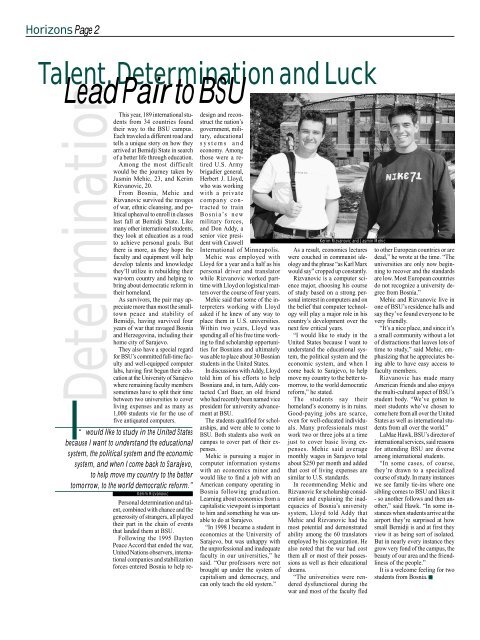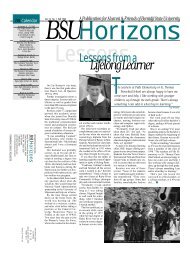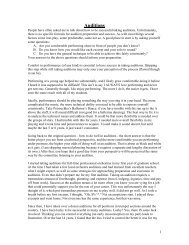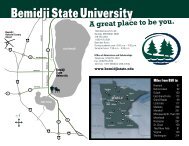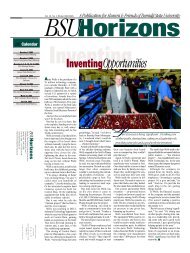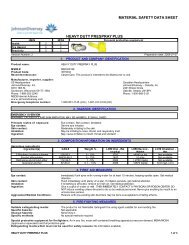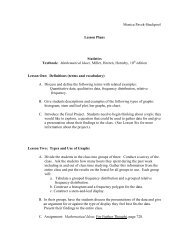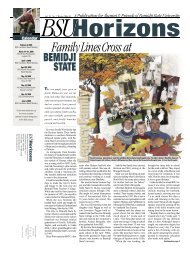Horizons Spring 2001 - Bemidji State University
Horizons Spring 2001 - Bemidji State University
Horizons Spring 2001 - Bemidji State University
Create successful ePaper yourself
Turn your PDF publications into a flip-book with our unique Google optimized e-Paper software.
<strong>Horizons</strong> Page 2<br />
Talent, Determination and Luck<br />
Lead Pair to BSU<br />
Determination<br />
This year, 189 international students<br />
from 34 countries found<br />
their way to the BSU campus.<br />
Each traveled a different road and<br />
tells a unique story on how they<br />
arrived at <strong>Bemidji</strong> <strong>State</strong> in search<br />
of a better life through education.<br />
Among the most difficult<br />
would be the journey taken by<br />
Jasmin Mehic, 23, and Kerim<br />
Rizvanovic, 20.<br />
From Bosnia, Mehic and<br />
Rizvanovic survived the ravages<br />
of war, ethnic cleansing, and political<br />
upheaval to enroll in classes<br />
last fall at <strong>Bemidji</strong> <strong>State</strong>. Like<br />
many other international students,<br />
they look at education as a road<br />
to achieve personal goals. But<br />
there is more, as they hope the<br />
faculty and equipment will help<br />
develop talents and knowledge<br />
they’ll utilize in rebuilding their<br />
war-torn country and helping to<br />
bring about democratic reform in<br />
their homeland.<br />
As survivors, the pair may appreciate<br />
more than most the smalltown<br />
peace and stability of<br />
<strong>Bemidji</strong>, having survived four<br />
years of war that ravaged Bosnia<br />
and Herzegovina, including their<br />
home city of Sarajevo.<br />
They also have a special regard<br />
for BSU’s committed full-time faculty<br />
and well-equipped computer<br />
labs, having first begun their education<br />
at the <strong>University</strong> of Sarajevo<br />
where remaining faculty members<br />
sometimes have to split their time<br />
between two universities to cover<br />
living expenses and as many as<br />
1,000 students vie for the use of<br />
five antiquated computers.<br />
I“ would like to study in the United <strong>State</strong>s<br />
because I want to understand the educational<br />
system, the political system and the economic<br />
system, and when I come back to Sarajevo,<br />
to help move my country to the better<br />
tomorrow, to the world democratic reform.”<br />
Kerim Rizvanovic<br />
Personal determination and talent,<br />
combined with chance and the<br />
generosity of strangers, all played<br />
their part in the chain of events<br />
that landed them at BSU.<br />
Following the 1995 Dayton<br />
Peace Accord that ended the war,<br />
United Nations observers, international<br />
companies and stabilization<br />
forces entered Bosnia to help re-<br />
design and reconstruct<br />
the nation’s<br />
government, military,<br />
educational<br />
systems and<br />
economy. Among<br />
those were a retired<br />
U.S. Army<br />
brigadier general,<br />
Herbert J. Lloyd,<br />
who was working<br />
with a private<br />
company contracted<br />
to train<br />
Bosnia’s new<br />
military forces,<br />
and Don Addy, a<br />
senior vice president<br />
with Caswell<br />
International of Minneapolis.<br />
Mehic was employed with<br />
Lloyd for a year and a half as his<br />
personal driver and translator<br />
while Rizvanovic worked parttime<br />
with Lloyd on logistical matters<br />
over the course of four years.<br />
Mehic said that some of the interpreters<br />
working with Lloyd<br />
asked if he knew of any way to<br />
place them in U.S. universities.<br />
Within two years, Lloyd was<br />
spending all of his free time working<br />
to find scholarship opportunities<br />
for Bosnians and ultimately<br />
was able to place about 30 Bosnian<br />
students in the United <strong>State</strong>s.<br />
In discussions with Addy, Lloyd<br />
told him of his efforts to help<br />
Bosnians and, in turn, Addy contacted<br />
Carl Baer, an old friend<br />
who had recently been named vice<br />
president for university advancement<br />
at BSU.<br />
The students qualified for scholarships,<br />
and were able to come to<br />
BSU. Both students also work on<br />
campus to cover part of their expenses.<br />
Mehic is pursuing a major in<br />
computer information systems<br />
with an economics minor and<br />
would like to find a job with an<br />
American company operating in<br />
Bosnia following graduation.<br />
Learning about economics from a<br />
capitalistic viewpoint is important<br />
to him and something he was unable<br />
to do at Sarajevo.<br />
“In 1998 I became a student in<br />
economics at the <strong>University</strong> of<br />
Sarajevo, but was unhappy with<br />
the unprofessional and inadequate<br />
faculty in our universities,” he<br />
said. “Our professors were not<br />
brought up under the system of<br />
capitalism and democracy, and<br />
can only teach the old system.”<br />
Kerim Rizvanovic and Jasmin Mehic<br />
As a result, economics lectures<br />
were couched in communist ideology<br />
and the phrase “as Karl Marx<br />
would say” cropped up constantly.<br />
Rizvanovic is a computer science<br />
major, choosing his course<br />
of study based on a strong personal<br />
interest in computers and on<br />
the belief that computer technology<br />
will play a major role in his<br />
country’s development over the<br />
next few critical years.<br />
“I would like to study in the<br />
United <strong>State</strong>s because I want to<br />
understand the educational system,<br />
the political system and the<br />
economic system, and when I<br />
come back to Sarajevo, to help<br />
move my country to the better tomorrow,<br />
to the world democratic<br />
reform,” he stated.<br />
The students say their<br />
homeland’s economy is in ruins.<br />
Good-paying jobs are scarce,<br />
even for well-educated individuals.<br />
Many professionals must<br />
work two or three jobs at a time<br />
just to cover basic living expenses.<br />
Mehic said average<br />
monthly wages in Sarajevo total<br />
about $250 per month and added<br />
that cost of living expenses are<br />
similar to U.S. standards.<br />
In recommending Mehic and<br />
Rizvanovic for scholarship consideration<br />
and explaining the inadequacies<br />
of Bosnia’s university<br />
system, Lloyd told Addy that<br />
Mehic and Rizvanovic had the<br />
most potential and demonstrated<br />
ability among the 60 translators<br />
employed by his organization. He<br />
also noted that the war had cost<br />
them all or most of their possessions<br />
as well as their educational<br />
dreams.<br />
“The universities were rendered<br />
dysfunctional during the<br />
war and most of the faculty fled<br />
to other European countries or are<br />
dead,” he wrote at the time. “The<br />
universities are only now beginning<br />
to recover and the standards<br />
are low. Most European countries<br />
do not recognize a university degree<br />
from Bosnia.”<br />
Mehic and Rizvanovic live in<br />
one of BSU’s residence halls and<br />
say they’ve found everyone to be<br />
very friendly.<br />
“It’s a nice place, and since it’s<br />
a small community without a lot<br />
of distractions that leaves lots of<br />
time to study,” said Mehic, emphasizing<br />
that he appreciates being<br />
able to have easy access to<br />
faculty members.<br />
Rizvanovic has made many<br />
American friends and also enjoys<br />
the multi-cultural aspect of BSU’s<br />
student body. “We’ve gotten to<br />
meet students who’ve chosen to<br />
come here from all over the United<br />
<strong>State</strong>s as well as international students<br />
from all over the world.”<br />
LaMae Hawk, BSU’s director of<br />
international services, said reasons<br />
for attending BSU are diverse<br />
among international students.<br />
“In some cases, of course,<br />
they’re drawn to a specialized<br />
course of study. In many instances<br />
we see family tie-ins where one<br />
sibling comes to BSU and likes it<br />
- so another follows and then another,”<br />
said Hawk. “In some instances<br />
when students arrive at the<br />
airport they’re surprised at how<br />
small <strong>Bemidji</strong> is and at first they<br />
view it as being sort of isolated.<br />
But in nearly every instance they<br />
grow very fond of the campus, the<br />
beauty of our area and the friendliness<br />
of the people.”<br />
It is a welcome feeling for two<br />
students from Bosnia.


